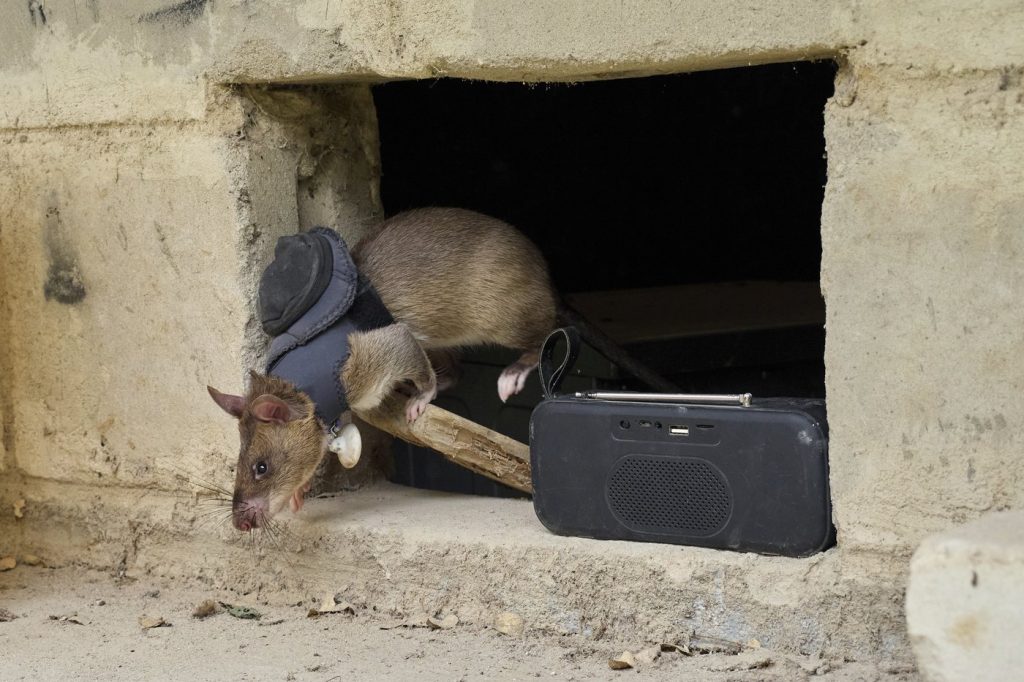MOROGORO, Tanzania (AP) – In a dramatic demonstration of innovative rescue techniques, a rat equipped with a backpack navigates through the debris of a simulated earthquake to locate a buried man. This rat, trained by the NGO APOPO, signals its success by activating a trigger that alerts rescuers above. After successfully pinpointing the survivor, the rat is rewarded with a banana, marking a successful mission in the Uluguru Mountains.
Fabrizio Dell’Anna, an animal behaviorist at APOPO, highlights the remarkable olfactory capabilities of the African giant pouched rats. "Their sense of smell is incredible," he states, explaining that these rats are capable of detecting explosives, tuberculosis, and can also correctly identify humans in distress. In addition to search and rescue missions, APOPO trains these rats to identify landmines, having cleared over 50,000 of them in locations like Angola and Cambodia since the program's inception.
APOPO has been training these "hero rats" since 2003, utilizing their heightened sense of smell for multiple life-saving applications. Training begins shortly after birth, and with an impressive lifespan of nearly a decade, these rats can serve on various missions throughout their lives. The cost associated with training each rat amounts to approximately 6,000 euros ($6,990). Their training is based on classical conditioning and positive reinforcement, ensuring that they are well-prepared for their assignments.
While the rats' impressive work in detecting explosives and aiding earthquake survivors garners attention, another group of rats working in laboratory settings is making significant contributions to global health—specifically in tuberculosis (TB) detection. APOPO's efforts in TB detection commenced in 2007, driven by the alarming reality that as many people die from TB daily as from accidents caused by landmines throughout an entire year, according to Christophe Cox, CEO of APOPO.
Tuberculosis remains a formidable foe, with the World Health Organization identifying it as the top infectious disease killer in its 2023 report, citing a staggering 1.25 million deaths. In Tanzania, the burden of TB is exceptionally high, with only about half of patients receiving accurate diagnoses, leaving many to inadvertently spread the disease. APOPO's rats play an essential role in mitigating this issue by screening samples of sputum from patients, accurately identifying cases that conventional testing might miss.
APOPO collaborates with 80 hospitals across Tanzania, collecting sputum samples daily for evaluation. Research indicates that the rats can detect six distinct volatile organic compounds associated with positive TB samples, enhancing the accuracy of TB diagnoses in a region that desperately needs it. With the ability to process 100 samples in just 20 minutes, the speed and efficiency of the rats' detection capabilities significantly surpass traditional methods.
Despite the success and efficacy of using trained rats, challenges remain. Operations are most effective in urban centers rather than remote locations where access to laboratories is limited. Additionally, the World Health Organization does not classify these rats as primary diagnostic tools but as a secondary method, requiring that any positive detection be confirmed by human microscopy before treatment is administered. This regulatory hurdle poses a barrier to broader acceptance and funding for APOPO’s initiatives, with Cox noting that mainstream funding typically does not reach organizations like APOPO due to its classification.
Understanding that the health community may question the unconventional method of using animals for disease detection, Cox emphasizes the importance of reaching the last patients who might otherwise go undetected. The focus remains on maximizing social impact by ensuring that those afflicted with TB receive the necessary care without delay. Despite the inherent challenges of employing live animals for medical detection, the results achieved by APOPO's trained rats underscore their value in the ongoing battle against TB.











